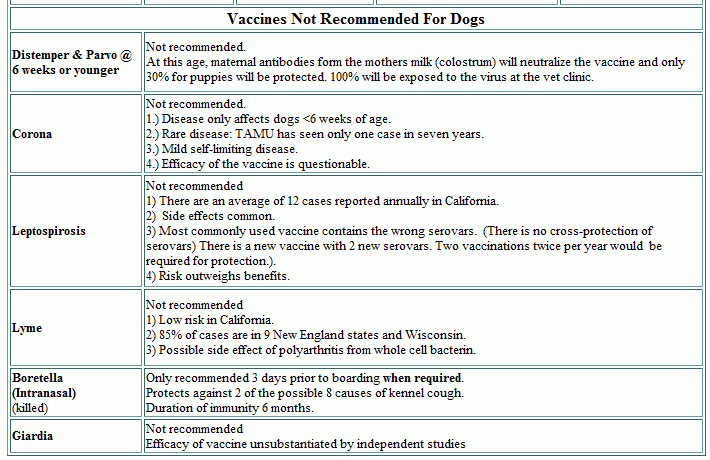The “Other” Dog Vaccines: Kennel cough, Rattlesnakes, and More
Last blog we covered Leptospirosis and Lyme. In this blog, we cover Kennel Cough, the Rattlesnake Vaccine, and Dr. Jean Dodd’s recommendations on non-core dog vaccines.
Bordatella and Parainfluenza
This is commonly referred to as the “Kennel Cough Complex”, and actually includes Bordatella, Parainfluenza, and CAV-1. Bordatella is caused by a bacteria, while Parainfluenza and Canine Adenovirus 1 (CAV-1) are both viruses.
Kennel cough is a mild condition in most dogs, is rarely life-threatening, and is usually self-limiting; it is best described as a common chest cold for dogs. While dogs that are boarded or shown regularly are encouraged to be vaccinated for Kennel Cough, this vaccine has limited effectiveness, and in some instances has even been shown to increase the incidence of the disease. The vaccine also protects against only a few of the multiple causes of kennel cough, meaning dogs that have been vaccinated for “Kennel Cough” can still be susceptible to the other causes of the disease. Dr. Martin Goldstein, author of The Nature of Animal Healing, states the following about the Bordatella vaccine:
“Kennel cough vaccines offer so little immunity as to be virtually worthless.” (pg 79)
Unfortunately, this very ineffective dog vaccine is still required by most boarding kennels, as kennel cough is highly contagious and can spread very easily in these situations. The duration of immunity for the vaccine is very short, lasting 6 months or less. This means people who frequently board their dogs have to repeatedly subject their animals to this ineffective vaccine, and yet still have a significant chance of their dog developing kennel cough anyway.
Rattlesnake Vaccine
The Rattlesnake Vaccine is available only to clients living in rattlesnake-prone area. It is a toxin vaccine made from components of the venom of the Western Diamondback Rattlesnake, and primarily protects against this rattlesnake only (although the company claims it also offers some cross-protection against several other species of rattlesnakes).
The Rattlesnake Vaccine does not actually “protect” the dog against the rattlesnake venom in the traditional sense. Rather, it simply extends the amount of time (by approximately one hour) it normally takes for the venom to affect the dog. This means vaccinated dogs bitten by a rattlesnake must still be rushed immediately to the veterinarian’s office, where they may still need to receive extensive treatment. Vaccinated or not, any dog bitten by a rattlesnake will require treatment in order to prevent further complications or potential death.
While the company’s own data suggests an adverse reaction rate similar to that of other dog vaccines, the anecdotal reports of adverse reactions are numerous and contain much more severe reactions such as autoimmune hemolytic anemia and even death. This vaccine is not recommended for most dogs — even those in “rattlesnake country” — due to its limited effectiveness, limited research, and need to revaccinate so frequently (2 or more times per year in certain areas).
So, does your dog need the rattlesnake vaccine? Probably not, unless they have a penchant for hunting rattlesnakes. Mortality associated with rattlesnake bites is very low, regardless of vaccination status. Even after being vaccinated, the dog must still be rushed to the vet and treated for the rattlesnake bite. The vaccine has little real research behind it, with most of its “research” coming from nationwide surveys rather than from carefully controlled challenge studies that are the gold standard in the industry. Regarding this vaccine, the UC Davis School of Veterinary Medicine states:
“Although a rattlesnake vaccine may be potentially useful for dogs that frequently encounter rattlesnakes, currently we are unable to recommend this vaccine because of insufficient information regarding the efficacy of the vaccine in dogs.”
Conclusion to Non-Core Diseases: Vaccinate or Not?
Should you vaccinate dogs for these other non-core diseases? Below is a chart from Dr. Jean Dodds regarding the most commonly used non-core dog vaccines, listing comments and recommendations on each.
Who should be vaccinated, then, for diseases like Lepto, Lyme, Kennel Cough, etc.? This decision should be made on a case-by-case basis after in-depth discussion between the client and the veterinarian, rather than having these non-core vaccines given to all clients regardless of individual risk. Owners must also be aware that even though their pet has been vaccinated for diseases like Leptospirosis and Lyme, their pet can still contract that very same disease. Thus, their dog has two risk factors instead of one: risk of a potential adverse reaction to the vaccine, and risk from the disease itself. Owners must seriously evaluate these risks prior to dog vaccination.
Next blog, we will provide tips on how to make vaccinations safer for your pet.



Perhaps you can write next articles referring to this article. I wish to read even more things about it! Nice post. I was checking constantly this blog and I am impressed! Extremely useful information specifically the last part 🙂